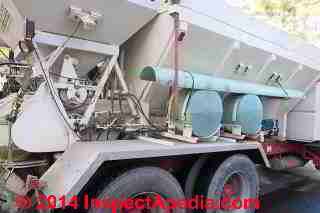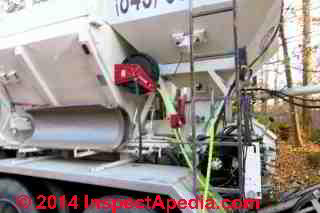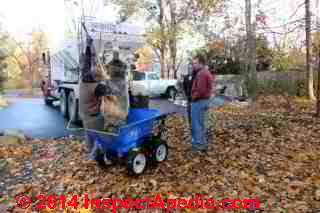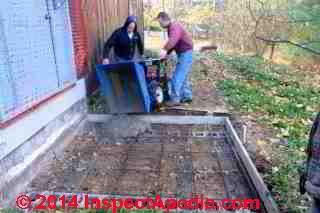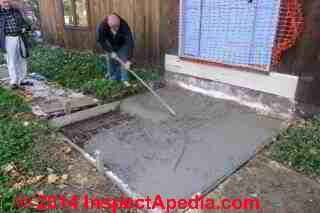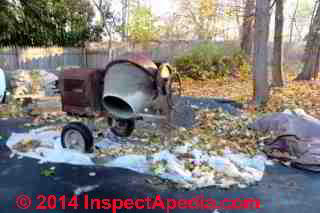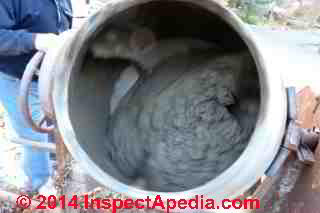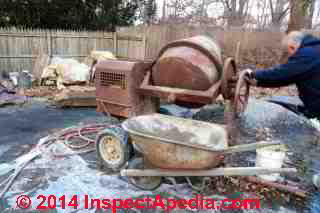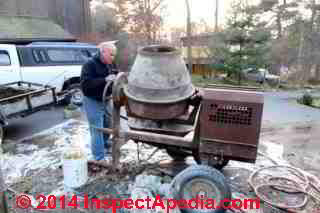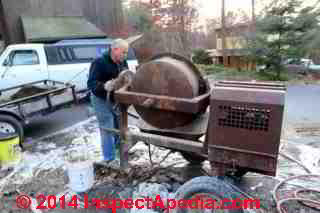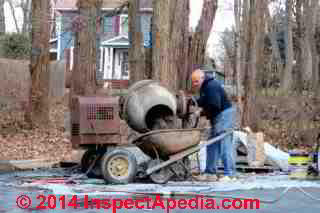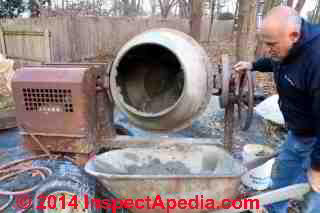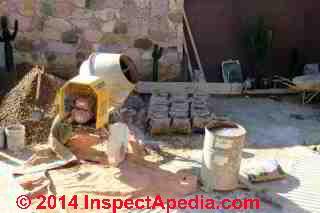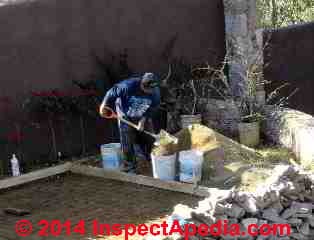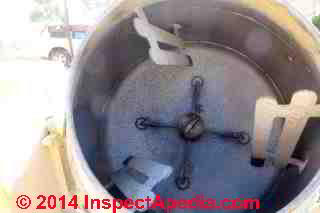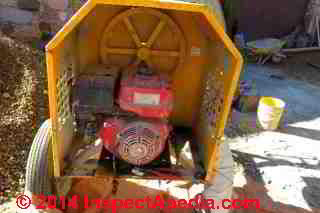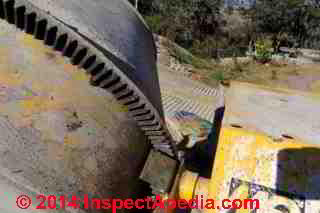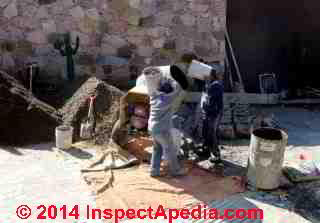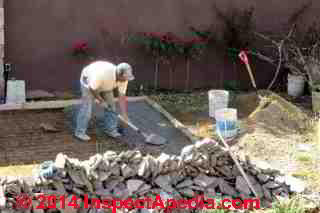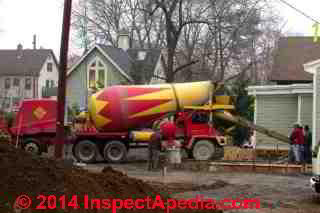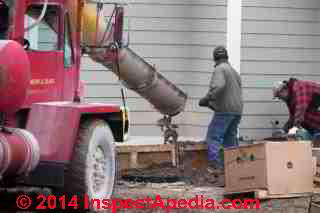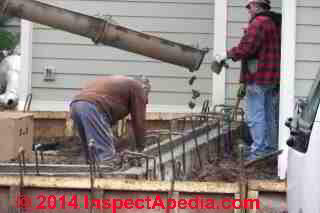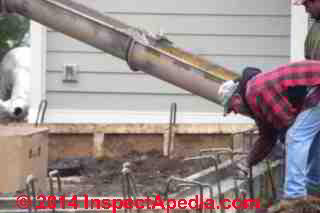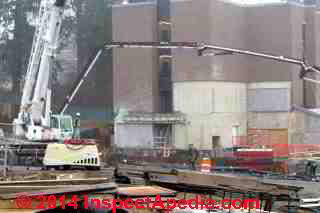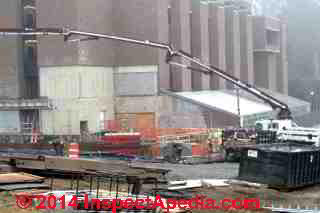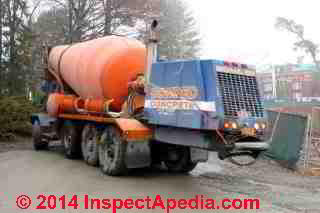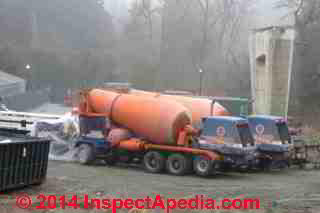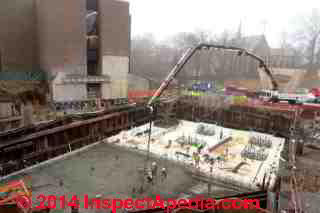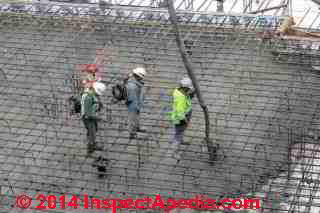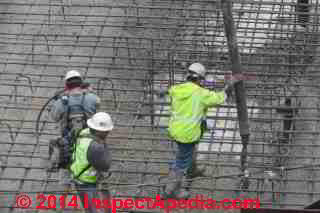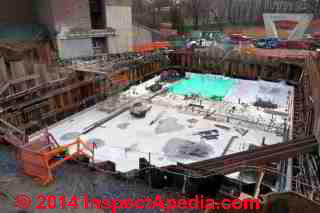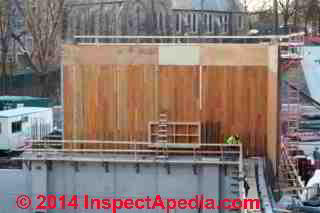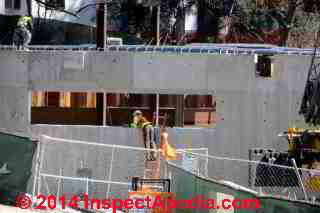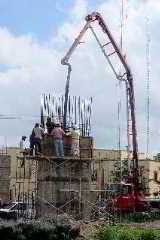 Concrete Delivery, Placement, Pour Methods
Concrete Delivery, Placement, Pour Methods
How is concrete mixed, delivered, poured?
- POST a QUESTION or COMMENT about concrete mixing, delivery & placement in construction of building foundations, footings, walls, floors, steps, walks, or other structures.
Concrete delivery, mixing, pouring methods:
How is concrete prepared at or delivered to the work site? Concrete Mixing, Delivery & Pouring methods vary depending on the job, from a bucket and trowel to concrete pumps & a continuous stream of concrete trucks.
Our page top photo shows concrete being delivered by crane-pump into concrete forms during the construction of a roadway overpass bridge in San Miguel de Allende, Guanajuato, Mexico.
InspectAPedia tolerates no conflicts of interest. We have no relationship with advertisers, products, or services discussed at this website.
- Daniel Friedman, Publisher/Editor/Author - See WHO ARE WE?
Concrete Mixing & Delivery
[DRAFT - Article text & images in process, comments & suggestions welcome - use the COMMENTS box at page end]
Concrete Truck Mixes Cement to Desired Properties On-Site Including Small Jobs
This concrete delivery truck is able to mix dry ingredients with water and other additives as needed, delivering the exact quantity of concrete needed for small or large concrete pours.
The system eliminates several concerns faced by concrete contractors, masons, and concrete delivery companies including concrete wastage, having to spill un-used concrete at a dump-site to protect the concrete mixer truck, and the ability to custom-adjust the concrete slump at the job site. This system also permits addition of treatments for frost protection when pouring in cold weather.
The concrete delivery service operating the on-site-mixing concrete truck shown here operates in the Hudson Valley of New York
and can be contacted by telephone at 845-691-3535.
Above: a motor-operated wheelbarrow is being used to carry and then pour concrete inside the forms that were set by the mason to form a base slab onto which a masonry entry stair will be constructed. The slab itself is supported by a concrete block foundation whose top you can see just to the right of that first pile of concrete inside the forms.
The mason used the concrete delivery on-site mix truck system shown above for his larger pour of the foundation for front entry stairs of the home shown in our photograph above.
During that part of the job the mason's own cement mixing equipment rested, rusting peacefully in Poughkeepsie.
Next, for the smaller quantities of mortar mix used to construct the stone-faced steps for this same entry stair the mason put his own cement mixer to work, shown in detail in the photographs just below. Just below we see a portable concrete mixer in operation.
Below you can see the mason pouring concrete out of his mixer; an antique wheelbarrow is in the foreground, matching both the mason and the author.
Below: the gas-engine-driven portable concrete mixer is kept upright during mixing ...
And tipped by the large wheel to pour mixed concrete into the wheelbarrow:
Below you see the mason has emptied the mixer into the wheelbarrow.
And is about to turn the mixer upright (below):
At the end of the day the mason uses a garden hose to was out any remaining concrete inside the mixer lest it set. Once concrete has hardened inside of any concrete mixing system, whether it's a bucket, mortar pan, power mixer, or a concrete truck, it's hell.
Cement mixer & hand pouring a stone & concrete parking area, Guanajuato, Mexico
Above we see supplies for hand-mixed concrete to be placed to form a drive and parking area for an RV in Guanajuato.
Below you can see that wire mesh was placed on the ground and held flat by a few rocks.
In my opinion a better concrete job will be had if the wire mesh or re-bar is lifted to about the center of the concrete slab or platform.
Just below we see the traditional precision measurement of concrete ingredients. The worker is filling a 5-gallon plastic bucket with sand.
Next, just below you see the mixing blades in the interior of the empty portable cement mixing machine. Washing out the cement mixer interior at the end of the day's use is essential if it's to remain usable.
Below we see operating details of this portable cement mixer: its gasoline engine
and below you see the mixing tub gears that the engine and its drive gear will operate to rotate the mixing vessel.
Below the workers are dumping sand and gravel into the cement mixer. Along with portland cement and water (the large barrel in the right of this photo) all of the key ingredients for mixing concrete are in place.
At above right the hand-poured concrete is rough-smoothed - the worker is using a shovel. When this steel wire-reinforced concrete slab was set the workers set a finished surface of flat stones - piled in the foreground in our photograph.
The slab is to be used to park a motor home or other vehicles visiting the property.
Cement mixer truck & chute delivery of pre-mixed concrete for parking lot curbs, Poughkeepsie, NY
In preparation for a new parking lot the concrete curbs are poured within the forms that you see throughout these photos.
Those U-shaped re-bars are simply used to hold the forms in place during pour and set of the concrete, speeding concrete form installation and removal.
Below: the worker is troweling the top of the concrete curb to smooth the pour.
Cement pump, continuous pre-mixed cement delivery, large pour - placement, Poughkeepsie NY
These photographs show the concrete construction of the bottom floor slab of the new "Bridge Building" - a new 80,000 sq. ft. science center being constructed in 2013-2016 at Vassar College in Poughkeepsie, New York.
The building was designed by Ennead Architects.
Above you can see the enormous reach of the concrete pumping truck across the job site and into the building's basement. A continuous stream of concrete trucks at the job site kept the pour continuous (below), ...
and below we see still more concrete trucks are lined-up waiting to deliver, keeping this job going.
Below is the concrete pump delivery point
and next, below, workers managing the concrete placement through the mesh of steel reinforcing re-bar.
Because the pour occurred in cold weather, the design included a specification for re-bar temperature as well as other details.
At least thirty truckloads of concrete were delivered to this job, timed to arrange continuously to permit a continuous pour.
Thanks to Brendan Clemente, Bonded Concrete Inc., Capital Region, Century Concrete, Inc. for providing information about this monstrous concrete placement operation. Mr. Clemente can be contacted at Tel: 518-273-5800 or by email to brendanc@bondedconcrete.com.
Below you can see the concrete wall forms
and finally, below, the completed concrete walls going up later on this same construction project.
...
Continue reading at CONCRETE COLD POUR JOINTS or select a topic from the closely-related articles below, or see the complete ARTICLE INDEX.
Or see these
Recommended Articles
Suggested citation for this web page
CONCRETE DELIVERY & MIXING at InspectApedia.com - online encyclopedia of building & environmental inspection, testing, diagnosis, repair, & problem prevention advice.
Or see this
INDEX to RELATED ARTICLES: ARTICLE INDEX to BUILDING STRUCTURES
Or use the SEARCH BOX found below to Ask a Question or Search InspectApedia
Ask a Question or Search InspectApedia
Try the search box just below, or if you prefer, post a question or comment in the Comments box below and we will respond promptly.
Search the InspectApedia website
Note: appearance of your Comment below may be delayed: if your comment contains an image, photograph, web link, or text that looks to the software as if it might be a web link, your posting will appear after it has been approved by a moderator. Apologies for the delay.
Only one image can be added per comment but you can post as many comments, and therefore images, as you like.
You will not receive a notification when a response to your question has been posted.
Please bookmark this page to make it easy for you to check back for our response.
IF above you see "Comment Form is loading comments..." then COMMENT BOX - countable.ca / bawkbox.com IS NOT WORKING.
In any case you are welcome to send an email directly to us at InspectApedia.com at editor@inspectApedia.com
We'll reply to you directly. Please help us help you by noting, in your email, the URL of the InspectApedia page where you wanted to comment.
Citations & References
In addition to any citations in the article above, a full list is available on request.
- Used Concrete Pumps for SDale: SICM - Solution for Construction Machinery www.sicmequip.com Skype: vivi-sicm Tel: 0086-731-84834959 Fax: 0086-73184834959 Cell Phone: 0086-15570894554 E-mail: sales@sicmequip.com sicm@sicmequip.com
- Baragary, Chance, and Hani A. Salim. "Effects of cold joints in blast resistant structural concrete [abstract]." In 2007 Undergraduate Research and Creative Achievements Forum (MU). University of Missouri--Columbia. Office of Undergraduate Research, 2007.
- Biel, Timothy D., and Hosin Lee. "Performance study of portland cement concrete pavement joint sealants." Journal of transportation engineering 123, no. 5 (1997): 398-404.
- Bussell, M. N., and R. Cather. Design and construction of joints in concrete structures. Vol. 146. Thomas Telford, 1995.
- Collepardi, M., R. Khurana, and M. Valente. "Construction of a dry dock using tremie superplasticized concrete." ACI Special Publication 119 (1989).
- Den Entwurf, Neue Deutsche Richtlinie Für, Zur Rückhaltung Von Wassergefährdenden Von Betonbauten, Nouvelle Directive Allemande Sur La Conception, R. E. T. E. N. T. I. O. N. De Produits, And Dangereux Pour L'eau. "New German Guideline For Design Of Concrete Structures For The Containment Of Hazardous Materials." Otto-graf-journal 17 (2006): 9.
- Erickson, Scott. "Pervious concrete durability testing." In Proceedings of the 2006 Concrete Technology Forum. 2006.
- Fowler, T. J. "Lessons Learned from Refractory Concrete Failures." ACI Special Publication 57 (1978).
- McCurrich, L. H., and N. R. Cook. "Airfield and road pavement use in the UK of high performance coal tar pitch PVC joint sealants, and a comparison of UK and ASTM standards." ACI Special Publication 70 (1981).
- Odum-Ewuakye, Brigitte, and Nii Attoh-Okine. "Sealing system selection for jointed concrete pavements–a review." Construction and Building Materials 20, no. 8 (2006): 591-602.
- Ribeiro, AC Bettencourt, J. Díez-Cascón, and A. F. Gonçalves. "Roller compacted concrete-tensile strength of horizontal joints." Materials and Structures 34, no. 7 (2001): 413-417.
- Sarsam, K. F., and M. E. Phipps. "The shear design of in situ reinforced concrete beam–column joints subjected to monotonic loading." Magazine of Concrete Research 37, no. 130 (1985): 16-28.
- Soliman, Haithem, Ahmed Shalaby, and Leonnie Kavanagh. "Performance evaluation of joint and crack sealants in cold climates using DSR and BBR tests." Journal of Materials in Civil Engineering 20, no. 7 (2008): 470-477.
- Yan, Shangyao, and Weishen Lai. "An optimal scheduling model for ready mixed concrete supply with overtime considerations." Automation in Construction 16, no. 6 (2007): 734-744.
- Yildirim, Yetkin, Yusuf Yurttas, and Ilker Boz. "Service Life of Crack Sealants." In First International Conference on Pavement Preservation. 2010.
- In addition to citations & references found in this article, see the research citations given at the end of the related articles found at our suggested
CONTINUE READING or RECOMMENDED ARTICLES.
- Carson, Dunlop & Associates Ltd., 120 Carlton Street Suite 407, Toronto ON M5A 4K2. Tel: (416) 964-9415 1-800-268-7070 Email: info@carsondunlop.com. Alan Carson is a past president of ASHI, the American Society of Home Inspectors.
Thanks to Alan Carson and Bob Dunlop, for permission for InspectAPedia to use text excerpts from The HOME REFERENCE BOOK - the Encyclopedia of Homes and to use illustrations from The ILLUSTRATED HOME .
Carson Dunlop Associates provides extensive home inspection education and report writing material. In gratitude we provide links to tsome Carson Dunlop Associates products and services.


